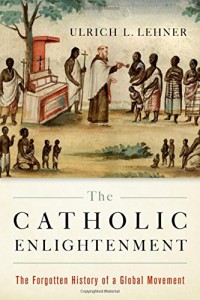 Acton Research Director Samuel Gregg reviews a new book at the Library of Law and Liberty that demolishes the canard that religious figure were “somehow opposed holus bolus to Enlightenment ideas is one that has been steadily discredited over the last 50 years.” In his review of The Catholic Enlightenment: The Forgotten History of a Global Movement by by Ulrich L. Lehner, Gregg points out that the new book shows how “the Enlightenment argument for freedom was embraced by many Catholic Enlighteners.”
Acton Research Director Samuel Gregg reviews a new book at the Library of Law and Liberty that demolishes the canard that religious figure were “somehow opposed holus bolus to Enlightenment ideas is one that has been steadily discredited over the last 50 years.” In his review of The Catholic Enlightenment: The Forgotten History of a Global Movement by by Ulrich L. Lehner, Gregg points out that the new book shows how “the Enlightenment argument for freedom was embraced by many Catholic Enlighteners.”
One of Lehner’s central themes is that the roots of Catholic Enlightenment thought are to be found in that most reforming of Church councils: the Council of Trent (1545-1563). Trent’s impact in terms of clarifying church dogmas and doctrines, curbing laxity among the clergy, implementing an extensive seminary and university reform program, and propelling the rise of dynamic religious orders (to name just a few changes) is hard to underestimate. Trent facilitated the development of a thoroughly orthodox, intellectually rigorous, and disciplined clergy; a renewed emphasis upon addressing social and economic problems; a repudiation of superstitious customs; and, perhaps most significantly, an emphasis that lay people were also called to holiness. This idea pervades, for instance, Saint Francis de Sales’ immensely influential Introduction to the Devout Life (1609).
Trent was therefore about improvement. And comprehensive efforts to better the human condition was a central leitmotif of the various Enlightenments and one to which, Lehner shows, many Catholics were naturally well-disposed. In some areas, such as enhancing women’s legal status and education, it turns out that Catholic reformers were well ahead of their Protestant and more secular-minded counterparts.
This helped create conditions for an engagement on the part of Catholic intellectuals with Enlightenment thinkers and ideas in fields ranging from philosophy and science to law and economics. Observing, for instance, the discoveries made through enhanced use of the empirical method, Catholics shaped by Trent’s reforms wanted to underscore the compatibility between faith and science. But they also desired to enhance the Church’s capacity to communicate its teachings “more widely and in a more conceptually clear manner.” That meant addressing criticisms of the Church and Catholic belief articulated by some Enlightenment thinkers.
“Catholic Enlighteners,” Lehner writes, “sought to show the public that they could successfully grapple with their intellectual counterparts and that they possessed the same intellectual abilities.” This, however, did not translate into outright rejection of every Enlightenment tenet: “Catholic Enlighteners saw some merit in the criticism and tried to refute them thoroughly while also ceding some ground.”
Read “An Enlightened Faith,” Samuel Gregg’s review of Ulrich Lehner’s new book The Catholic Enlightenment: The Forgotten History of a Global Movement at the Library of Law and Liberty.

